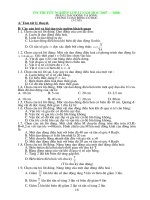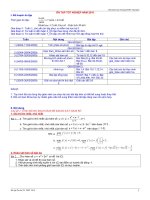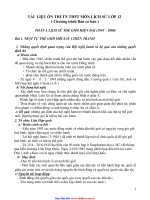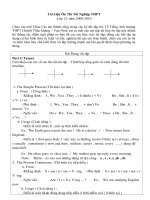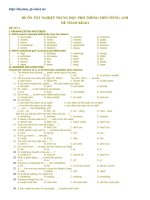Tai lieu on thi TN mon anh
Bạn đang xem bản rút gọn của tài liệu. Xem và tải ngay bản đầy đủ của tài liệu tại đây (1.97 MB, 86 trang )
A. Gramar
B. Vocabulary.
1.Tenses and usage
1. Part of speeches and the
position of them
2. INFINITIVES AND
GERUNDS
2. Prefixes and suffixes
1.
Modal verbs
4. Subject and Verbs
Ageement
5. Comparision of Adjectives
6. Tag questions.
7. Relative clauses
8. REPORTED SPEECH
9. CONDITIONAL SENTENCES
10. PASSIVE VOICE
11. ADJECTIVES OF
ATTITUDE
12. ADVERBIAL CLAUSES
C. Exercises
A.
Gramar (Ng÷ ph¸p)
KiÕn thøc ®· häc:
1.Tenses and usage
Tense
Form
Use
s
The
A: S +verb(es, • An action
prese
s)
in the
nt N: S + don’t/
present
simpl
doesn’t+
taking
e
verb(infinitiv
place
e)
once,
Q: Do/ Does +
never or
S
several
+verb(infinit
times
ive)..?
- An action
set by a
timetable
or
example
- I usually
walk to
school
- I have
English on
Friday
- The sun
rises in the
Present A: S + be + • To describe
continuo
V-ing
an action
us
N: S + be +
taking place
not + Vin the
ing
moment of
Q: Be + S +
speaking.
V-ing…? • An action
happening
around
now, but
perhaps not
at the
moment of
speaking .
• An action
arranged
for the
future
• After the
-They are playing
football in the
garden at the
moment.
- She is studying
Maths at
university.
-We are having a
test next week.
-Smell! Something
is burning
Present
A: S + have/has
perfect
+ PII
N: S
+haven’t/has
n’t + PII
Q: Have/ Has +
S + PII…?
Present
A: S + have/has
perfect
+ been + Vcontinuou
ing
s
N: S +
haven’t/hasn’
t + been + Ving
Q: Have/has + S
+ been + Ving…?
- An action that
has taken place
once, never or
several times
- An action which
happened in
the past but
still up to
present.
- An action which
happened in
the past and
shows the
result at
present
- I’ve never visited Ha
Long Bay before.
• Putting emphasis
on the course
or duration (not
the result)
• An action that
refers to an
activity and still
going on
• Finished action
- I have been waiting for
a long time.
- I have studied English
since I was 12
- I have had a broken
leg because of that
stair
- My teacher has been
teaching me since
2005.
- He has been cleaning
up his room all day.
Past
A: S + V-ed/ V2
simple N: S + did not
(didn’t) +
Verb
Q: Did + S +
Verb…?
Past
continuo
us
• To describe an
action in the
past taking
place once,
never or
several times
• Actions taking
place one
after another
A: S + be (was/ • An action going
were) + Von at a certain
ing
time in the
N: S +
past
was/were + • Actions taking
not + V-ing
place at the
Q: Was/Were +
same time
S + V-ing..?
• An action in the
past that is
interrupted by
another action
- Tom went to Paris in
1990 .
- I saw Mary, then I
ran to her
immediately
- What were you doing
from 3p.m to 6p.m
yesterday?
- My father was
watching TV while I
was learning.
- My friends was bitten
by a dog while she
was talking with
me.
Past
perfect
A: S + had + PII
N: S + had not
(hadn’t) + PII
Q: Had + S +
PII…?
• An action taking
- When I got up, my
father had already
place before a
left.
certain time in
- It was the most
the past
difficult question that
• Sometimes
I had ever known.
interchangeable
- Until yesterday, I had
with past
never heard about it.
perfect
progressive
• Putting emphasis
only on the fact
(not the
duration)
Past
perfect
continuou
s tense
A: S + had +
been + V-ing
N: S + hadn’t +
been + V-ing
Q: Had + S +
been + Ving…?
• An action taking
- The men had been
playing card for 3
place before a
hours.
certain time in
- When I came to see
the past.
them they were
• Sometimes
playing chess .They
interchangeable
said they had been
with past
playing for two hours.
perfect simple
• Putting emphasis
on the duration
or course of an
Near
A: S + be
• intention
- He is going to give
Future
+going to +
a party next week.
made for the
Verb (bare- It’s going to rain
future.
infinitive)
• predict action
N: S + be +
that surely
not + going
happen in the
to + verb
future
Q: Be + S +
going to +
verb…?
Future
simpl
e
A: S +will/
shall+ Verb
(bareinfinitive
- express an
action that
happens in
the future but
not surely.
- predict an
action that
probably
happens in
the future
- Will is used in
keeping the
- The play will be
over at ten oclock.
- I think it will rain
next week.
- The music is too
loud. I’ll turn it
down.
- He will waite for
Future
continuo
us
A: S +will/
shall+ be +
verb-ing
- express an
- This time tomorrow I
action that is
will be flying to
happing in the
Hanoi.
future.
- express an
- Next year, I will be
intention that
living in Hanoi.
will happen
2.
INFINITIVES AND GERUNDS
a.Some common verbs followed by infinitives
agree
determine
manage
promise
appear
demand
arrange
refuse
prepare
happen
offer
seem
learn
hope
plan
want
decide
learn
pretend
threaten
b. Some common verbs followed by
gerunds
admit
avoid
fancy
finish
imagine
keep
miss
risk
deny
dislike
mind
suggest
forgive
save
object (to)
consider
enjoy
prevent
practise
delay
c. Some common verbs followed by either
gerunds or infinitives
like
propose
stop
Go on
love
forget
try
prefer
begin
permit
regret
consider
continue
intend
remember
need
start
Allow
mean
advise
3. Modal verbs
Mỗi một động từ hình thái đợc chia giống nhau ở tất cả các ngôi và theo
sau bởi dạng nguyên mẫu không có To. Đông từ hình thái trong tiéng Anh
gồm: can, could, had better, might, must, ought to, shall, should, will,
would. Mỗi động từ dùng để diễn đạt một nét nghĩa khác nhau
A.
ề nghị lịch sự/ xin phép
Câu đáp lại
Với chủ ng I
May, Could,
Can....
(Cho phép
tôi....)
- May I borrow your pen? - certainly/ of course
- Could I borrow your
- yes, certainly
pen?
- yes, of course
Với chủ ng
You, Would,
Could, Can...
( Bạn làm ơn...)
- Would you lend me a
pen?
- Could you lend me a
pen?
- Can you lend me a
pen?
- yes, Id be happy to
- yes, Id be glad to
- Certainly.
- Id like to, but...
Would you
mind...
(Phiền bạn/
- Would you mind if I
closed the window ?
- Would you mind
- No, not at all.
- No, of course not.
- No, that would be fine.
Sự bắt buộc
Hiện tại
Quá khứ
Từ chủ quan
Must
- All citizen must
obey the laws.
- As children, we had to
obey our parents.
Từ khách quan
Have to
- I have to go now. I
have a class in
ten minutes.
- I had to study last night
for the test.
B.
Dạng phủ định của Must and Have to
Dạng viết tắt
Sự không cần thiết
( không phải/ không
cần)
- We do not have to go - We dont have to
to class today.
go to class today.
Sự cấm đoán không
cần
( không đợc)
- You must not smoke
in hospital.
- You mustnt
smoke in
hospital.
C.
Lời khuyên
Hiện tại
Quá khứ
Should
- You should study harder.
- You shouldnt play too
much.
- You should have
studied last week.
Ought to
- You ought to try harder.
- You ought not to play too
much. (ít dùng)
- We ought to have
tried harder last
week.
Had better
- You had better study
harder.
- You d better not play too
much.
- We had better have
tried harder last
week.
D.
ề nghị
Với Modal verbs
Với chủ ng I/ WE - Shall I open the
Shall
window?
- Lets go, shall we?
Tơng đơng với
- Why dont we open the
window?
- Lets open the window.
E
.
Møc ®é ch¾c ch¾n
HiÖn t¹i
Qu¸ khø
100%( ®éng tõ ë trùc - Jill is sick. She isn’t - Jill was sick yesterday.
th¸i c¸ch)
well.
- Tom worked hard then.
- Tom works hard.
>95%
Must/ Can not/Could
not
- Jill must be sick.
- Jill can’t be well.
- Jill couldn’t be well.
- Jill must have been
sick.
- Jill can’t have been
well.
- Jill couldn’t have been
well.
>50%
May/ Might/ could/
May not/ Might not
- Jill may be sick.
- Jill might be sick.
- Jill could be sick.
- Jill may have been
sick.
- Jill might have been
sick.
- Jill could have been
sick
F. USED TO
Hành động quá
khứ
Khẳng định
Used to
- My uncle used
expresses a habit, to live in Japan
activity, or
situation that
existed in the
past but which no
longer exists.
Lặp đi lặp lại
Would
- My father would
tell me a story
before bedtime
when I was a
child.
Phủ định/ nghi
vấn
- I didnt use to
live in Japan.
- Did you use to
live there?
4. Subject and Verbs Ageement
Thông thờng trong tiếng Anh
một chủ ngữ số ít đợc theo sau
bởi một động từ chia ở số ít.
Một chủ ngữ số nhiều đợc theo
sau bởi một động từ chia ở số
nhiều. Tuy nhiên có một số dạng
bất qui tắc và một số điểm cần
lu ý khi hai hoặc nhiều chủ ngữ
đợc đứng trớc một động từ theo
bảng sau:
A.Cơ
bn
Chủ ng
Số ít hoặc số
nhiều
Xác định đúng
chủ ng
ộng từ ở số ít
ộng từ ở số
- My uncle lives in
Hanoi.
- The book we buy is
new.
- My aunts live in
Hue.
- The books he
buys are
expensive.
ứng sau:There - There is a cat on
+ Be...
the table.
Là danh động
từ
- Reading books is
useful.
nhiều
- There are five
books on the
table.
B. Danh tõ víi c¸c tõ chØ sè l
îng
Tõ chØ sè lîng
Đéng tõ ë sè Ýt
Each, every, one
- Each student needs a
textbook.
- Every student has come.
- One of the students is
absent.
Some
Most
A lot of, Fractions,
percent
- Some/ Most money is
needed.
- Some/ Most of the rice is
good.
- Two thirds of water is frozen
- Five percent of the money
has been spent.
Đéng tõ ë sè
nhiÒu
- Some / most
children are not
well.
- a lot of
students come
late.
- Two thirds of
the students in
the class are
boys.- Five
percent of the
students are
A/ The number of
- The number of students is
increasing.
A great deal of
- A great deal of money is
spent.
C. Danh tõ víi c¸c tõ nèi.
Tõ nèi c¸c chñ ngữ
Đéng tõ
- A number of
students have
come.
-
VÝ dô
and, both..... and
Chia ë sè nhiÒu
- Both my mother and
my father are here.
As well as
With, together with,
along with
Chia theo chñ ngữ 1
- My mother as well
my sisters is here.
- My mother together
with my sisters is
here.
Not only..but also,
either ....or ,
neither ...nor
Chia theo chñ ngữ 2
- Not only my mother
but also my sisters
are here.
- Either my mother or
D. Một số ở dạng bất
qui tắc.
ở số ít
Ví dụ
Danh từ có hỡnh thức số nhiều:
- Một số bệnh nhất định:
measles, mumps, rabies,
diabetes....
- Tên gọi các môn khoa học:
physics, mathematics, statistics,
linguistics...
- Danh từ khác: news, billiards....
- Measles is a common childhood
disease.
- Physics is my favourite subject.
- No news is good news.
- Một số danh từ riêng chỉ tên
thành phố hoặc tên nớc có hỡnh
thức số nhiều: Naples, Marseilles,
the United states, the
Philippines.....
- Marseilles is a city in France.
- The Philippines is in Asia.
Cụm danh từ chỉ số lợng đ - Six miles is a long distance
ợc đề cập nh là một đơn - Two years is long enough.
vị:
- The fifty dollars he gave
- Một khoảng cách:Two
me was soon spent.
metres, ten miles...
- Một khoảng thời gian: five
days, six weeks...
- Một số tiền: five dollars,
ten pounds...
-Cụm từ với and đợc hiểu
- Fish and chips is Toms
nh một đơn vị: fish and
favourite.
chips, meat pie and peas, - Bed and breakfast doesnt
bread and butter, bed and
cost much.
breakfast...
- Two and two is four.
- Biểu thức toán học với:
and
ë sè nhiÒu :
- Mét sè danh tõ tËp hîp( collective nouns)
:people, police, staff, cattle, the rich......
Eg: + Those people are from England.
+ The police have been informed.
+ Cattles are domestic animals.
- Danh tõ chØ sè lîng ®îc ®Ò cËp ®Õn nh mét
tæng thÓ gåm nh÷ng c¸ nh©n riªng lÎ.
+ Eight dollars are on the table.
+ Ten years have passed.
- Mét sè danh tõ cã d¹ng sã nhiÒu bÊt qui t¾c:
bacterium- bacteria, medium- media, criterioncriteria, datum- data, fungus- fungi, stimulusstimili, phenomenon – phenomena....
+ Some phenomena of nature include thunder
and lighting.
+ There are some criteria we need to know.

